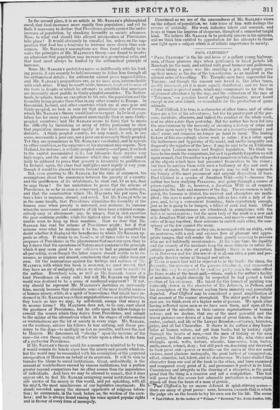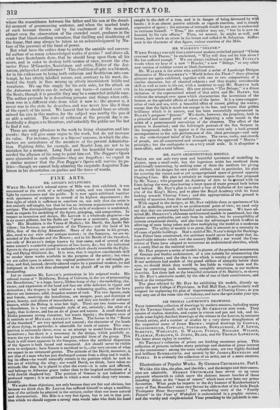" PAUL CLIFFORD" is the life and loves of a
gallant young highway- man, of those glorious days when gentlemen in laced jackets left Ranelagh for the road, and robbed with good humour and politeness, —when taking a purse was like cracking a jest, and people gave up their money as the due of the tax-collector, as an incident in the natural order of travelling. The Turnpike-men have superseded the Turpins ; and though the amount now levied is. like other taxes, greatly increased, yet it is more equally distributed ; and we have in return much-improved roads, which may compensate us for the loss of pleasant adventures by the way, and the extinction of the race of " Tobymen,"—a peculiar breed of sporting character, never found except in our own island, so remarkable for the production of game animals.
Paul Clifford, it is true, is a character of other times, and of other times are a few of his adventures ; but the Par greater part of the per- sons, incidents, allusions, and indeed the conduct of the whole work, is of no older a date than yesterday. But the author has been led into the anachronism by the necessity of elevating a history of crime and a satire upon society by the introduction of a romantic criminal ; and alas ! crime and romance no longer go hand in hand. The leading feature of this exceedingly clever work is • satire : it is a satire upon the hollowness and hypocrisy of the world, and on the inequality and frequently the injustice of the laws : it may be said to be an Utilitarian satire upon London morals and English legislation. We think we have before made the comparison, but as it is probably- forgotten we will again remark, that the author is a perfect camele on in taking the colours of the objects which have last presented themselves to his vision ; but then he catches them with such a brilliancy of dye and such a variety of shade, that each of his aspects may be said to approach the beauty of the most permanent and original disposition of hues. Paul Clifford is a species of Jonathan Wild—why ?—becauSe the author has been studying FIELDING, and going through a course of prison-visiting. He is, however, a Jonathan Wild in all respects adapted to the taste and manners of the day. The coarseness is miti- gated, the humour is diluted, the incident and characters are multi- plied ; the hero is made a gentleman, falls in love with a lady of de- gree, and, being a convenient foundling, finds opportunely enough, just as he is going to be hanged, a father of rank and fame. Other improbable circumstances are introduced, in compliance with the tastes of novel-readers ; but the main body of the work is a new.and able Jonathan Wild view of life, manners, and morals—men and their rules of living together, their schemes to outwit each other, the con- spiracy of the few against the many. The war against things as they are, is managed with an ability, with an acuteness, with a rich and copious flow of pleasant and appro- priate images, that will render the book greatly amusing to persons who are not habitually novel-readers. At the same time, the rapidity and the vivacity of the incidents keep the more didactic or rather dis- putative parts in a state of perfect fluidity : there is no stagnation, vs in Devereux and the Dimmed—it is all eau vire, a pure and per- t- *nail), flowing spring of thought and action. ---- . There is much that wiil be objected to in the book : the slang, the learavity, the gros see:. s of the persons int roduc Al , and represented, to the life, may be e:pected to prodace Fret :,- mach the same effect as three weeks at the tread- mill,—where, such is the author's facility at imitation, it might shrewdly be suspected he had passed a brief itportion of his existence. His talent fbr this branch of painting was eminently shown in the character of Mr. Johnson, in Pelham, and his description of the thieves asylum there minutely and powerfully depicted. Paul Clifford may be considered a great amplification of that account of the rogues' stronghold. The other parts of a higher cast are, we think, even of a higher order of powers. We speak after shaving reflected upon men as we have seen them, and upon all the 'creations of the novelists in their various reproductions of human 1 nature ; and we declare, that one of the most 'powerful and the • truest pictures ever drawn of a bad man of great talents, is the cha.- meter, portrait, and life of the Lawyer Brandon,—attorney, banister, judge, and all but Chancellor. It shows' in its author a deep know- ledge of human nature, not got from books, but by looking right through the hearts of men,—not the men of history or the men of poetry, but the men of reality, who live the life, who strive and struggle, speak, write, lecture, wheedle, time-serve, trim, barter, smile, assert, retract, deny ; but still push on, deceiving and deceived, to their great end—power or wealth—on the arena of this our most vicious, most glorious metropolis, the great hotbed of exaggeration, effort, stimulus, toil, talent, and tic douloureux. We have studied this character from one end of the book to the other, and have examined and compared every point of it, and pronounce it perfect in its kind. Consistency and integrity in the drawing of a character, is the great proof that the thing is a creation and not a compilation. This test will prove that this severe but admirable portraiture is a conception ' stir ck off from the brain of a man of genius., ........ ..._.. aul Clifford is by no means deficient in spirit-stirring scenes— there are many of great power : none, however, exceeds that in which the judge sits on the bench to try his own son for his life. The scene * Paul Clifford. By the Author of a Pelham," a cevereux," &c. 3 vols. London, 1539, where the resemblance between the father and his son at the dread- ful moment of pronouncing sentence, and when the marked traits of each become thrown out by the excitement of the moment, attract even the observation of the crowded court, produces in the reader that blood-curdling sensation, that thrilling and shuddering of the frame, that may always be taken as an acknowledgment by Na- ture of the presence of the hand of power. But what have the critics done to irritate the amiable and success- ful author of so many acknowledged works of genius ? and above all, what have Scotchmen done, that he should heap upon them all his scorn, and in order to destroy both vermin at once, invent the cha- racter Peter 111‘Grawler, Scotchman and critic, Editor of the Asi- nmum, pickpocket and informer ? This ebullition of spite is a blemish, for in his endeavour to bring both criticism and Scotticism into con- tempt, he has utterly falsified nature, and, contrary to his wont, dis- torted the truth in thus mixing up utterly inconsistent habits and vocations. We say this simply for his own sake, for the attack on the Asinceum writers can do nobody any harm—it cannot even vex the Scots, though it is possible they may be a somewhat irritable race. The author pretends he is describing persons and things when criti- cism was in a different state from what it now is : the answer is, it never was in the state he describes, and was never less like it than at the epoch of his novel. We lament that he should have so utterly missed his aim in this matter, for the subject was worthy the pen of so able a satirist. The state of criticism at the present day is un- doubtedly a disgrace to literature, and unluckily the public are the last to find it out.
There are many allusions in the work to living characters and late events : they will give some vogue to the work, but do not increase its value. For instance, there is a thieves' carouse, in which the cha- racters are caricatures of the members of the present Administra- tion. Fighting Attie, for example, and Scarlet Jem, are not to be mistaken for a moment. Long Ned and his beautiful hair scarcely needed the allusion of his song to point him out. The Beggars Opera once abounded in such allusions—they are forgotten : we expect in a similar manner that the New Beggar's Opera will survive its po- litics—though we cannot help adminng the exquisite Augustus Tom- linson in his dissertation on parties and the force of words.



















 Previous page
Previous page